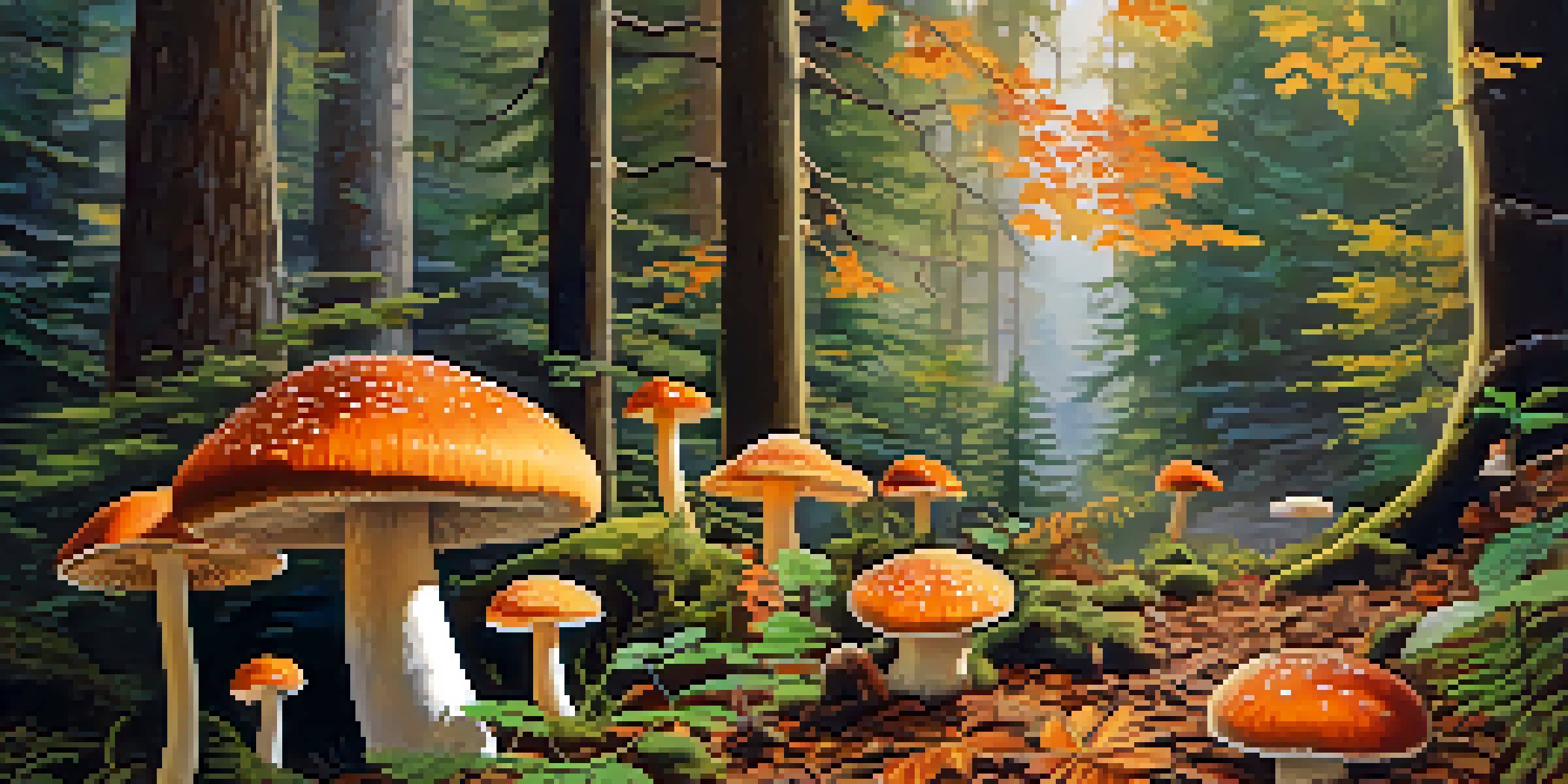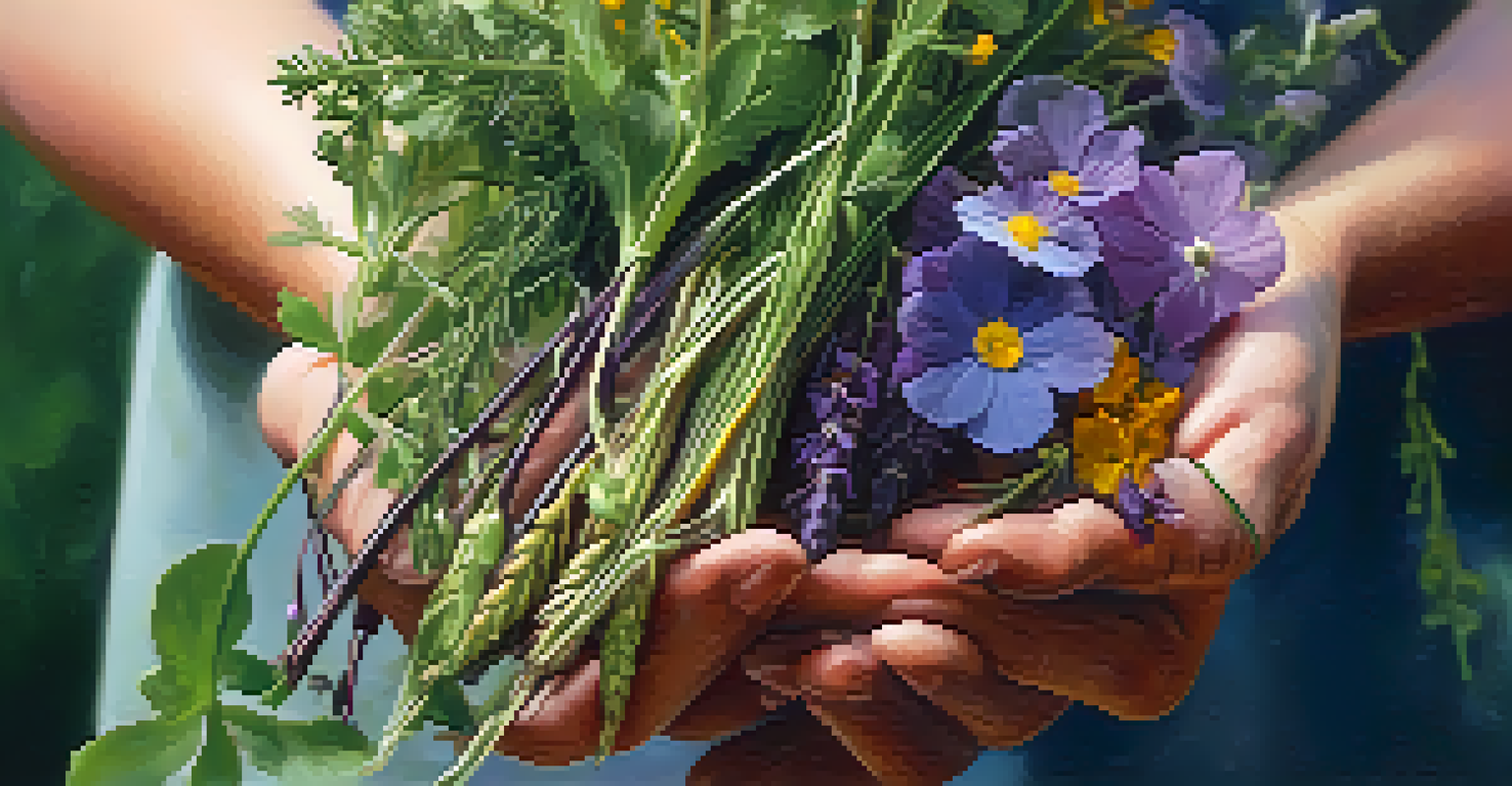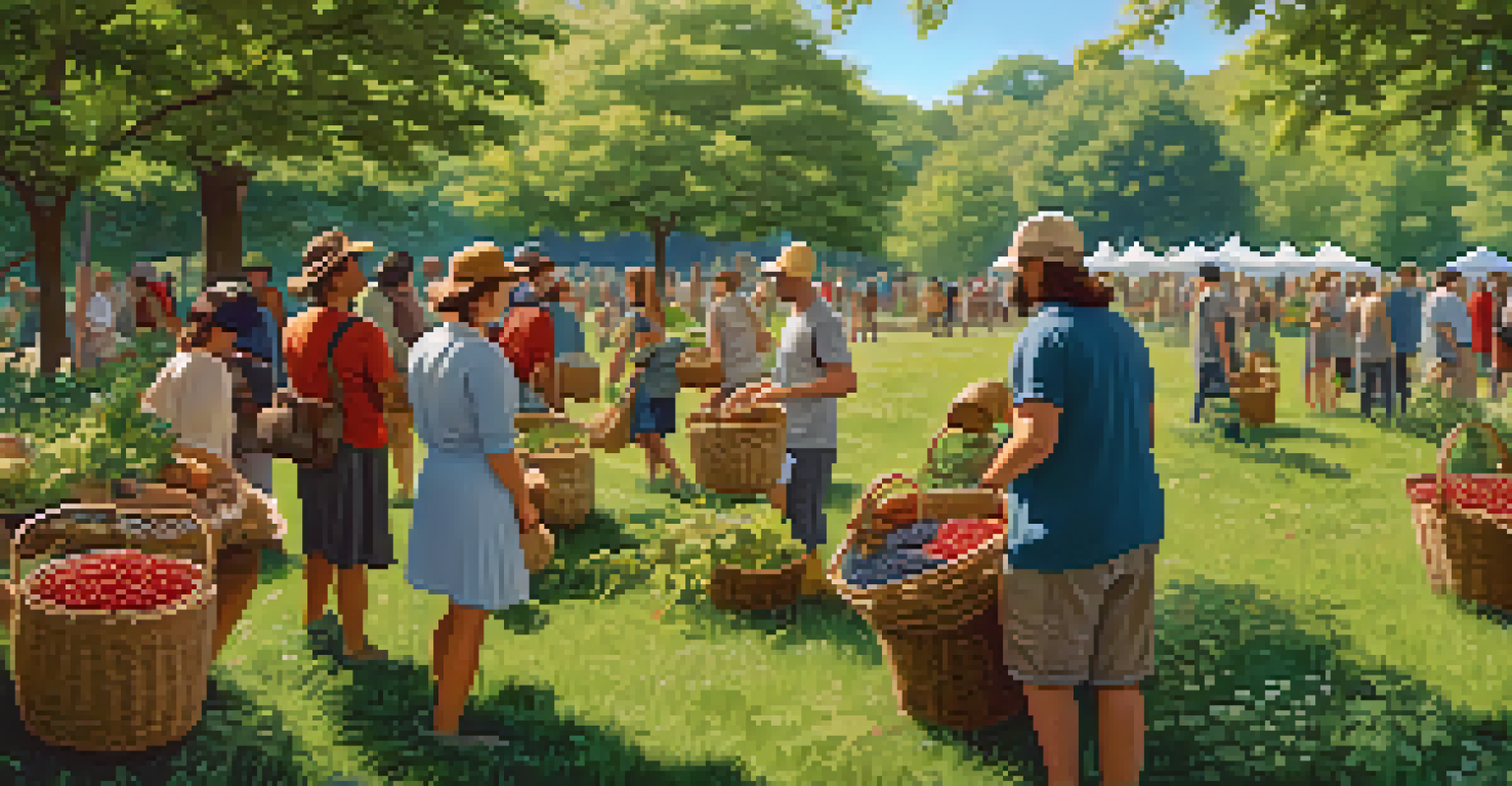The Role of Foraging in Sustainable Food Practices

Understanding Foraging: What It Is and Its Importance
Foraging is the practice of searching for and collecting wild food resources. It connects us to nature and allows us to enjoy seasonal and local ingredients. By understanding what to gather and how to do it responsibly, foragers contribute to a sustainable food system.
Foraging is a way of connecting with the natural world, and it helps us understand our place within it.
In a world where food is often mass-produced and transported, foraging offers a refreshing alternative. It encourages us to appreciate the diversity of our local environments and the bounty they provide. Additionally, foraging promotes a deeper awareness of ecosystems and the roles various plants and animals play within them.
The importance of foraging extends beyond personal consumption; it can also enhance community resilience. When people engage in foraging, they often share knowledge and resources, fostering stronger connections within their communities and supporting local biodiversity.
Sustainable Practices: How Foraging Fits In
Foraging aligns closely with sustainable food practices by emphasizing local and seasonal consumption. Instead of relying on industrial farming, foraging encourages individuals to make use of what is naturally available around them. This not only reduces our carbon footprint but also supports the health of local ecosystems.

Moreover, foraging can help mitigate food waste. Many edible plants and mushrooms grow abundantly in areas often overlooked, meaning that foragers can collect food that would otherwise go unused. This approach encourages a mindset of valuing all food sources and recognizing their potential.
Foraging Connects Us to Nature
Foraging allows individuals to engage with local ecosystems and appreciate seasonal, wild food resources.
Additionally, when done sustainably, foraging can enhance biodiversity. By promoting the growth of native plants and understanding their roles in the ecosystem, foragers can contribute to maintaining balanced habitats. This, in turn, supports a wider variety of wildlife and plant species.
The Nutritional Benefits of Foraged Foods
Foraged foods are often packed with nutrients, sometimes even more so than their cultivated counterparts. Wild plants and mushrooms can provide a diverse array of vitamins, minerals, and antioxidants that support overall health. By incorporating these foods into our diets, we tap into a rich source of nutrition that is both natural and free.
The act of foraging is not just about gathering food; it's about gathering knowledge, fostering community, and nurturing the environment.
Moreover, foraging encourages a more varied diet. Since foraged foods are typically seasonal and local, foragers often explore different ingredients throughout the year, leading to a more diverse intake of nutrients. This variety can help prevent dietary monotony and contribute to better health.
Additionally, many foraged foods have unique flavors and textures, enriching our culinary experiences. From wild garlic to edible flowers, these ingredients inspire creativity in the kitchen and encourage us to experiment with new recipes, enhancing our appreciation for what nature offers.
Foraging and Climate Change: A Response
As climate change continues to impact agriculture and food production, foraging presents an adaptive strategy. Wild food sources can be more resilient to changing weather patterns and environmental stressors. By relying on foraging, we can diversify our food supply and reduce dependency on vulnerable agricultural systems.
Moreover, foraging can help us reconnect with local ecosystems, fostering a sense of stewardship. When we understand and appreciate the plants and animals around us, we are more likely to advocate for their protection and sustainability. This mindset is crucial in combating the effects of climate change.
Sustainable Practices in Foraging
By embracing foraging, we reduce our carbon footprint and promote biodiversity through responsible harvesting.
In this way, foraging not only provides food but also encourages us to think critically about our relationship with nature. By promoting local food systems and biodiversity, foraging can be part of a larger strategy to address climate-related issues.
Legal and Ethical Considerations in Foraging
Foraging is not without its legal and ethical considerations. It's essential to understand local regulations regarding wild food collection, as some areas may have restrictions to protect certain species or habitats. Being informed helps ensure that foraging practices are sustainable and respectful of the environment.
Ethically, foragers should practice the principle of 'leave no trace.' This means taking only what you need and ensuring minimal impact on the ecosystem. Sustainable foraging practices protect plant populations and the wildlife that depends on them while allowing future generations to enjoy these resources.
Additionally, foragers should be mindful of the cultural significance of certain plants and gathering practices. Respecting indigenous knowledge and practices can enrich our understanding of foraging and promote a more inclusive approach to wild food collection.
Foraging: A Community-Centric Approach
Foraging can be a wonderful communal activity that brings people together. Whether through organized foraging events or informal outings with friends, sharing the experience of finding and gathering food fosters a sense of community. These activities can also serve as educational opportunities, enabling participants to learn about local flora and sustainable practices.
Community foraging not only strengthens social bonds but also promotes food sovereignty. By engaging in local food systems, communities can reclaim agency over their food sources and make empowered choices. This can lead to increased interest in sustainable practices and a greater appreciation for local ecosystems.
Foraging Fosters Community Bonds
Participating in foraging activities strengthens social connections and empowers communities to reclaim their food sources.
Additionally, community foraging can support local economies. When foragers come together, they can share their bounty, trade goods, or even create local markets for foraged items, enhancing economic resilience. This collaborative spirit exemplifies how foraging can positively impact both individuals and communities.
Getting Started: Tips for New Foragers
If you're interested in exploring foraging, starting small is key. Begin by identifying safe, recognizable plants in your area, and consider joining a local foraging group or taking a guided tour. This can provide invaluable knowledge and boost your confidence as you learn about wild edibles.
As you become more experienced, keep a foraging journal to document your finds, recipes, and experiences. This not only helps track what you’ve learned but also deepens your connection with the natural world. Over time, you'll build a personal reference of edible plants and their uses.

Finally, remember to respect the environment and practice sustainable foraging. Take only what you need, avoid overharvesting, and always leave some plants behind to ensure their continued growth. With patience and mindfulness, foraging can become a rewarding and sustainable part of your lifestyle.